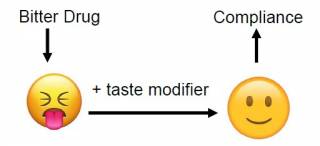Biopharmaceutics of taste masking taste modifiers in paediatric medicines
How this project explores ‘taste-modifiers’ which could have promise in taste-masking paediatric formulations, and assesses commonly used taste-masking agents for their effect.
11 November 2019
Funder
EPSRC
Team
Danielle Andrews, Dr Smita Salunke, Professor Abdul Basit, Professor Catherine Tuleu
Project (PO3): Objective Output Outcome
Acceptable palatability of medicines is especially important for paediatric formulations. Taste-masking excipients can be used but one needs to be mindful that they could alter drug bioavailability either because of a positive effect on palatability, which would facilitate the intake of the active pharmaceutical ingredient (API) or they can alter gastrointestinal parameters and thus affect the negatively absorption of the API.
The objective of this project is to:
1. Understand more about ‘taste-modifiers’ which could have promise in taste-masking paediatric formulations
- Taste-modifiers can be added to formulations to act as bitter-blockers in the mouth to prevent unpalatable drugs interacting with bitter receptors and thus improve compliance to these medicines. These excipients are relatively unexplored but could offer an alternative to adding numerous sweeteners and flavours which can be suboptimal with potential negative effect on gut microbiota. A systematic review will allow the ranking of excipients for their potential use as excipients in paediatric medicines.
- An experimental evaluation of prioritised excipients will assess the level they need to be used at o achieve bitter blocking of model drugs.
2. Assess commonly used taste-masking agents for their effect on GI absorption of model drugs in paediatric animal models
- Many commonplace sweeteners used in children’s medicines have been assumed inert and their potential ability to influence bioavailability has not been investigated. Some of these excipients have demonstrated detrimental gastrointestinal effect in adults, for example the ability to alter small intestinal transit time or intestinal permeability with a knock-on effect on bioavailability.
- With this in mind, the gastrointestinal effect of frequently used polyols in juvenile animal models will be assessed, specifically focusing on their influence on intestinal permeation of model drugs.
The outcome could influence the choice of excipients used in paediatric medicines.

Image: Graphic showing how taste-modifiers can improve the taste of a bitter drug and therefore improve compliance.
 Close
Close

